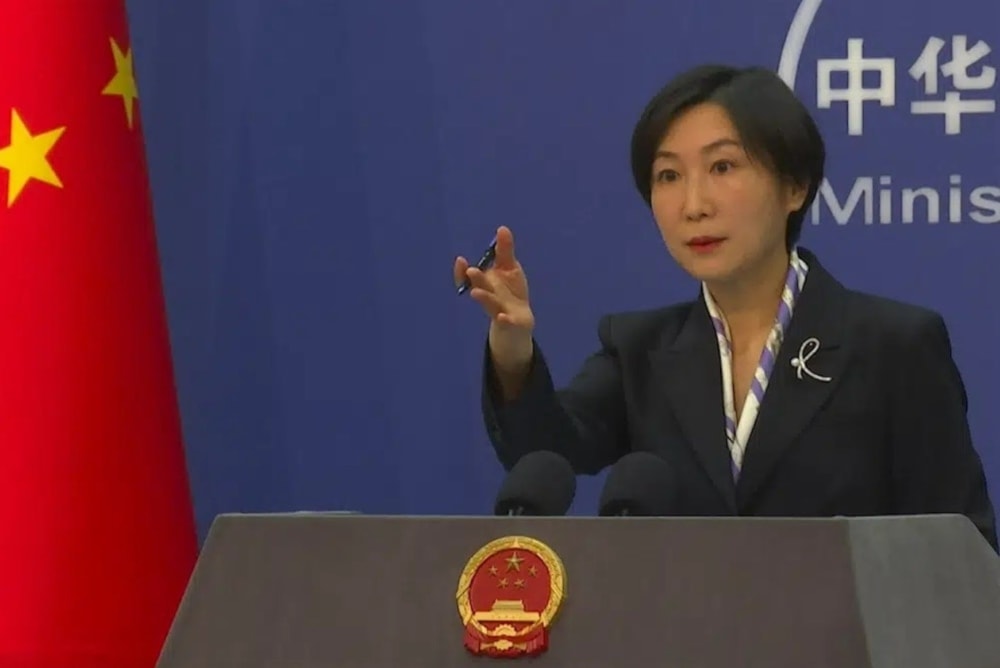China slams US over Taiwan leader’s Hawaii stopover
China condemns the United States for facilitating a "transit" stop in Hawaii for Taiwanese President Lai Ching-te, asserting that the move violates its sovereignty and undermines China-US relations.
-

Chinese Foreign Ministry spokesperson Mao Ning gestures during a press conference at the Ministry of Foreign Affairs in Beijing, on March 1, 2023. (AP)
China has voiced strong opposition to the United States allowing Taiwanese President Lai Ching-te to make a "transit" stop in Hawaii, asserting that such actions infringe upon its sovereignty. The Chinese Foreign Ministry announced it has lodged "serious protests" with Washington over the matter.
According to Taiwan's Central News Agency (CNA), Lai Ching-te is currently on a diplomatic tour to the Marshall Islands, Tuvalu, and Palau, with planned transit stops in Hawaii and Guam. The CNA reported that Lai arrived in Hawaii on Sunday for a two-day layover.
It is worth noting that Hawaii and Guam are home to two major US military bases.
The Chinese Foreign Ministry issued a firm statement: "China firmly opposes any form of official interaction between the US and the Taiwan region, firmly opposes any trip by leader of the Taiwan authorities to the US in any name or under whatever pretext, and firmly opposes any form of US connivance or support for 'Taiwan independence' separatists and their separatist activities. China strongly condemns the US’s arranging for Lai Ching-te’s 'stopover' and has lodged serious protests with the US."
The Ministry also underscored that the Taiwan issue is central to China's "fundamental interests" and represents "the first red line that cannot be crossed in China-US relations." It urged the US to halt official interactions with Taiwan and to avoid sending "false signals to Taiwanese separatists."
"China will closely follow the developments and take resolute and strong measures to defend our nation’s sovereignty and territorial integrity," the Ministry stressed.
Why it matters
Taiwan currently has formal diplomatic ties with 12 nations, including Paraguay, Belize, and the Vatican, maintaining connections with others through "economic and cultural missions." Over recent years, several nations, such as El Salvador, Panama, and the Solomon Islands, have severed ties with Taiwan to establish formal relations with China.
Tensions surrounding Taiwan escalated in August 2022 following then-US House Speaker Nancy Pelosi’s visit to the island. Beijing condemned the visit as support for Taiwanese separatism and conducted large-scale military drills in response, reaffirming its claim over Taiwan as part of its territory.
US authorizes $385mln military sale to Taiwan
The US State Department has authorized a potential $385 million sale of F-16 jet and radar spare parts to Taiwan, the Pentagon announced on Friday. The approval came just ahead of Taiwan President Lai Ching-te's sensitive trip to the Pacific.
According to the Pentagon's Defense Security Cooperation Agency, the approved sale includes $320 million worth of spare parts and support for F-16 fighter jets, as well as Active Electronically Scanned Array (AESA) radars and related equipment.
The Pentagon announced that the State Department also authorized a potential $65 million sale to Taiwan for enhanced mobile subscriber equipment and related support with General Dynamics being the primary contractor.
Taiwan's Defense Ministry expressed confidence that the agreements would take effect within a month, stating that the equipment would support the operational readiness of its F-16 fleet and contribute to "building a credible defense force."
"Taiwan and the United States will continue to strengthen their security partnership and work together to maintain peace and stability in the Taiwan Strait and the Indo-Pacific region," the Defense Ministry continued.
US drafts contingency plans for Taiwan
Washington has been reinforcing regional alliances and regularly deploying ships and fighter jets in the Taiwan Strait and South China Sea, actions that have drawn strong objections from Beijing.
In this context, the United States is preparing contingency plans for potential military deployments in Japan and the Philippines in the event of what it described as a Taiwan-related emergency, according to a report by Japan's Kyodo news agency. These plans will be part of the first joint operation plan set to be finalized in December, sources familiar with Japan-US relations revealed.
The plans reportedly include the deployment of a US Marine regiment equipped with HIMARS (High Mobility Artillery Rocket System) along Japan’s Nansei island chain, which stretches from Kyushu to Yonaguni, close to Taiwan.
According to the report, if a Taiwan contingency becomes imminent, temporary bases would be established on inhabited islands. This approach reportedly aligns with US military guidelines, which emphasize deploying marines in small units across multiple locations.
Japan’s role would primarily involve logistical support for the marine unit, such as providing fuel and ammunition. In addition, the US Army plans to station Multi-Domain Task Force long-range fire units in the Philippines, as per the news agency.
The Japanese and Philippine defense ministries did not immediately respond to requests for comment. While the US embassy in Manila declined to comment, the Chinese embassy in Manila stated it had "noted" the Kyodo report.

 5 Min Read
5 Min Read








